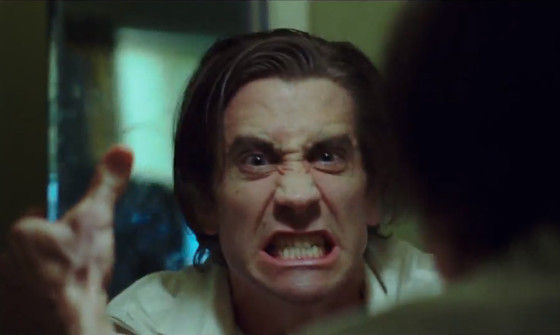
Nightcrawler
The most disappointing thing about Nightcrawler is there isn’t more of it.
Not that it’s a short movie: 117 minutes of film should be sufficient for most stories, and Nightcrawler is no exception. But when the credits roll, you can’t help but wonder how far an antihero like news prowler Louis Bloom (Jake Gyllenhaal, Enemy) can go. He worms his way into the Los Angeles news scene with lies and manipulation, hurtling headlong into a familiar darkness.
An emotionless sociopath and thief, Bloom discovers the city’s world of journalism by accident. He witnesses a freelance news crew film a car crash; drawn by the exploitative nature of nightcrawling, he buys his own camcorder and police scanner.
Things escalate for Bloom as he glues his ear to his police scanner and begins chasing sirens. He quickly realizes the blood sport of the local crime beat aligns with his skill set: exploiting the weak and defenseless.
Shoving a camera in the faces of victims of shootings and house break-ins, he begins ascending the ranks of local news coverage. At every scene, there’s another body, and human lives mean no more to him than dollars and cents.
But Bloom’s exploitations don’t end at the crime scenes. Throughout Nightcrawler, he manipulates his coworkers and competitors, cutting down anyone who stands in his way and poisoning anyone with an exposed vulnerability. To help with his filming, he hires hapless Rick (Riz Ahmed, Closed Circuit), a near-homeless man desperate enough for money to respond to Bloom’s employment ad even though it doesn’t specify what kind of work the job is.
What makes Gyllenhaal’s character so captivating is that he doesn’t seem to want anything. He has no goals in life. Though Bloom works his way up the food chain, breaking laws and tampering with crime scenes, it’s not because of any lofty ambitions of being rich and important. He does it simply because he loves to exploit others: It’s the only thing he enjoys or knows how to do.
As such, it becomes his obsession and his only drive. Everything is a means for Bloom to continue his exploitations. He operates like an unfeeling machine, pursuing input in the form of money and power in order to continue moving forward.
When he manipulates newsroom director Nina (Rene Russo, Thor: The Dark World) into first going on a date with him and then having sex with him, he does so not out of pleasure but as leverage over someone stuck in a moment of vulnerability. He takes pleasure in taking advantage of her, but not in the physical sex — that’s simply to further his resources.
With no goals to work toward, Bloom’s character develops little, but that’s not meant as a slight to the movie. It simply illustrates further how creepily inhuman Bloom is. He doesn’t grow or change a bit after his successes or failures because he places no value on the experiences. Any joy he gets from his successes is a result of anticipating more opportunities to prey on the helpless.
Among the numerous misguided mottos Gyllenhaal’s character purports throughout the movie is his claim that he’s a fast learner. Given the rate at which he picks up the skills needed to get to a crime scene and film it faster than anyone, such a claim might seem true at first blush.
But in reality, Bloom doesn’t learn a thing: He observes and mimics others, but in truth, his entire being is a facade, masking his inability to understand or appreciate true intelligence and human pleasure. From his flashy red car to the lifeless smile painted on his gaunt face, Bloom’s life is about appearances.
For Nightcrawler, Gyllenhaal dishes out a disturbingly emotionless antihero. Much like the car wrecks Bloom exploits, the movie makes you want to cringe and keep watching at the same time.



